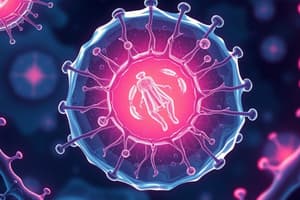Podcast
Questions and Answers
What is the process by which generic cells change into specific cells meant to do certain tasks within the body called?
What is the process by which generic cells change into specific cells meant to do certain tasks within the body called?
- Cell replication
- Cell division
- Cell differentiation (correct)
- Cell specialization (correct)
What term describes organisms consisting of a single cell?
What term describes organisms consisting of a single cell?
unicellular
What is the term for organisms that are made up of multiple cells?
What is the term for organisms that are made up of multiple cells?
multicellular
What is the vascular tissue in plants that conducts water and nutrients upward from the root?
What is the vascular tissue in plants that conducts water and nutrients upward from the root?
What is the function of phloem in plants?
What is the function of phloem in plants?
What are the cells called that have the potential to develop into many different types of cells in the body?
What are the cells called that have the potential to develop into many different types of cells in the body?
What term describes the distinct types of material in animals or plants formed by specialized cells?
What term describes the distinct types of material in animals or plants formed by specialized cells?
What is an organ?
What is an organ?
What is an organ system?
What is an organ system?
Flashcards are hidden until you start studying
Study Notes
Cell Specialization
- Cell specialization, or differentiation, transforms generic cells into specific cells that perform unique functions.
- This process is crucial during embryonic development, allowing for the formation of diverse cell types.
Unicellular Organisms
- Unicellular organisms are composed of a single cell, examples include protozoans and some algae.
- These organisms carry out all life processes within one cell.
Multicellular Organisms
- Multicellular organisms consist of multiple cells working together, enabling complex structures and functions.
- This organization allows for specialization and division of labor among cells.
Xylem
- Xylem is a type of vascular tissue in plants that transports water and dissolved nutrients from the roots to the rest of the plant.
- It contributes to the formation of woody structures in stems, providing support and stability.
Phloem
- Phloem is a vascular tissue that carries sugars and other metabolic products downward from the leaves, distributing energy throughout the plant.
- It plays a vital role in plant metabolism and growth.
Stem Cells
- Stem cells possess the ability to differentiate into various cell types, acting as a repair mechanism for tissues in the body.
- Two primary types of stem cells exist: embryonic stem cells, which can form any cell type, and adult stem cells, which have a more limited range of differentiation.
Tissue
- Tissue is a collection of specialized cells that work together to perform specific functions within plants and animals.
- Different types of tissues include muscle tissue, nervous tissue, and connective tissue, each serving distinct roles.
Organs
- Organs are self-contained structures within an organism that perform essential functions, like the heart for circulation and the liver for detoxification.
- Each organ comprises different tissues working synergistically.
Organ Systems
- An organ system consists of groups of organs that collaborate to fulfill particular biological functions, such as the digestive system or respiratory system.
- Each system is composed of specific tissues and contributes to overall homeostasis and health in the organism.
Studying That Suits You
Use AI to generate personalized quizzes and flashcards to suit your learning preferences.




